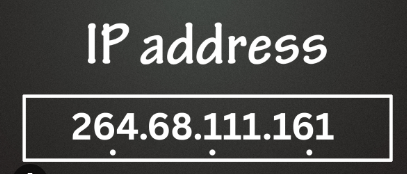Contents
Introduction to IP Addresses
264.68.111.161 in today’s digital landscape, understanding IP addresses is more important than ever. They serve as unique identifiers for devices connected to the internet, helping them communicate and share information. Whether you’re browsing websites, streaming videos, or connecting with friends on social media, your IP address plays a crucial role in how you navigate the online world.
One such intriguing example is 264.68.111.161—a specific IP address that raises questions about privacy and security in our increasingly interconnected lives. But what does it mean for you? And why should you care? Let’s dive into this topic and uncover everything you need to know about 264.68.111.161 and its significance in today’s internet-driven society.
What is 264.68.111.161?
264.68.111.161 is an IP address, a unique identifier assigned to devices on the internet or local networks.
This specific address falls within the IPv4 format, which consists of four sets of numbers separated by periods. Each set can range from 0 to 255, creating millions of potential addresses for various devices.
When you see 264.68.111.161, it may represent a device such as a computer or server attempting to communicate over the web.
IP addresses are essential for routing traffic and ensuring data reaches its intended destination smoothly.
Understanding this address helps in grasping how online connectivity operates and emphasizes the importance of digital identification in networking contexts.
The Importance of IP Address Security
IP address security is crucial in today’s digital landscape. With cyber threats on the rise, protecting your online identity has never been more important.
An IP address can reveal personal information about you, like your location and internet service provider. This data can be exploited by malicious actors for phishing attacks or identity theft.
Securing your IP means safeguarding your privacy. It helps prevent unwanted access to sensitive information and shields you from potential harassment or surveillance.
Employing measures like a VPN (Virtual Private Network) encrypts your connection and masks your true IP address. This adds an extra layer of protection against prying eyes.
Moreover, understanding the risks associated with unsecured IP addresses empowers users to take control of their online presence. Awareness is the first step towards staying safe in this interconnected world.
How to Protect Your IP Address
Protecting your IP address is crucial for maintaining online privacy. One effective method is using a Virtual Private Network (VPN). A VPN encrypts your internet connection, masking your real IP address from prying eyes.
Another option is to use proxies. Proxies act as intermediaries between you and the websites you visit, providing an additional layer of anonymity.
Regularly updating your router’s firmware can also enhance security. Outdated software may leave vulnerabilities that hackers could exploit.
Enabling firewalls on your devices adds another safeguard against unauthorized access. This simple step helps block malicious traffic before it reaches you.
Be cautious about sharing personal information online. Even seemingly harmless details can lead back to revealing your IP address if misused by others.
Potential Dangers of Sharing Your IP Address
Sharing your IP address can open a Pandora’s box of risks. First and foremost, it reveals your location to anyone who knows how to track it. This could lead to unwanted attention or even harassment.
Moreover, cybercriminals often exploit shared IP addresses. They can launch attacks targeting devices connected through that address, potentially compromising personal data or hijacking accounts.
Public forums and social media platforms are common traps where people unknowingly share their IP information. Once out in the wild, this data can be collected by malicious actors for nefarious purposes like identity theft or phishing scams.
Even seemingly harmless online interactions carry risks when you expose your IP address. It’s crucial to recognize these dangers and take proactive steps in safeguarding your privacy while browsing the web.
Tips for Changing Your IP Address
Changing your IP address can enhance your online security and privacy. There are a few simple methods to achieve this.
First, you can restart your router. This often results in a new dynamic IP assigned by your Internet Service Provider (ISP). Simply unplug the device for about 5 minutes before plugging it back in.
Using a Virtual Private Network (VPN) is another effective option. VPNs route your internet traffic through their servers, giving you an entirely different IP address while encrypting your data.
You might also consider using proxy servers. They act as intermediaries between you and the web, masking your actual IP address with theirs.
Contacting your ISP directly could be beneficial if you need a static change or encounter issues with automatic assignments. They may accommodate requests for new addresses based on specific reasons or needs.
Conclusion To 264.68.111.161
Understanding IP addresses is crucial in today’s digital landscape. The specific address 264.68.111.161 may not be widely known, but it serves as a reminder of the importance of cybersecurity and privacy online.
IP address security plays an essential role in safeguarding personal information from potential threats. By taking steps to protect your IP address, you minimize the risk of unauthorized access and data breaches.
Sharing your IP address can lead to numerous risks, including identity theft and hacking attempts. Therefore, being cautious when sharing any personal information online is vital.
Changing your IP address periodically adds another layer of protection against unwanted intrusions or tracking by malicious entities.
Staying informed about these aspects will empower you to navigate the internet safely while maintaining control over your own digital footprint.
